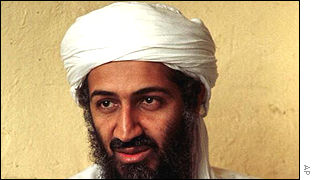

The suggestion is that Islamist dissident Osama bin Laden or some of his supporters may have tried to profit from stock trading by engaging in 'short selling' of stocks likely to be affected by the atrocities.
Selling short allows investors to bet that a stock will decline in value.
The sectors in the spotlight include reinsurance, airlines and armaments.
Germany's securities watchdog BaWe said it had launched a probe into unusual share movements in the run up to the attacks.
Market manipulation
Share movements are constantly monitored by financial watchdogs, who stressed that there was as yet no clear evidence that Mr bin Laden, whom the US government described as a "prime suspect" in last week's attacks, had attempted to gain from a plunge in share prices.
"We are taking a routine look at the share prices of various stocks. This will involve the examination of all types of shares," a BaWe spokeswoman said.
But the German watchdog is understood to have informed America's Securities and Exchange Commission (SEC) of its suspicions.
The investigation is expected to focus on Munich Re, the world's biggest reinsurance company, which has lost 22% of its value in the past two months, 13% of that in the week before the attacks on America.
The movement could have been triggered by those aware of the planned attacks short-selling the firm's shares.
Reinsurers Swiss Re and France's Axa also suffered big falls in their share price in the run up to Tuesday's attacks.
The losses took place against a backdrop of falling markets.
But the reinsurance sector might normally have been expected to hold its value in a declining market, as a typical defensive stock, observers said.
Reinsurance companies provide coverage for losses by insurers.
Financial links
Mr bin Laden is thought to have indulged in stock market speculation in the past.
According to reports in Italian newspaper Corriere della Sera, he used a Milan brokerage to invest in European markets.
But, the newspaper added, the name of the broker had not been released.
It said that European authorities were investigating possible financial links to Bin Laden in Luxembourg, Switzerland, Monte Carlo and Cyprus, where Mr bin Laden's organisation is reported to have had a base, with a company, offices and employees.
Japanese investigation
A separate investigation is reported to be under way in Japan.
"The Securities and Exchange Surveillance Commission Friday started to investigate if Mr Osama Bin Laden, who is suspected of masterminding the terrorist attacks in the United States, has traded in securities markets in Japan," reported Japanese news wire Jiji Press.
The commission's investigation is understood to be focusing on the trading of futures contracts.
In the futures market, investors bet on movements in prices and can make huge profits if prices go in the desired direction.
The news agency said Mr bin Laden had made large profits by trading futures contracts in European stock and foreign exchange markets.
Greater transparency
Some reports in the US have suggested that Tuesday's attacks may have been funded by speculation on the European stock markets.
The news is likely to lead to calls for greater transparency in share dealing, to make it harder for market players to conceal their identity.
The Organisation for Economic Co-operation and Development (OECD) has repeatedly called for the regulations to be tightened to prevent money laundering and profiteering by criminal groups.
Italy's defence minister Antonio Martino fuelled debate on Monday by saying that he thought terrorist organisations engaged in speculation on international financial markets.
Speaking in an interview with Italian newspaper, Mr Martino said: "I think that there are terrorist states and organisations behind speculation on the international markets."
Meanwhile, US authorities are reported to be investigating whether profits from European share trading by groups linked to bin Laden could have been placed in US banks.
Frankfurt's Deutsche Bse carried out its own investigation into share movements on 10 and 11 September, but found no evidence of irregularities.
A Deutsche Bse spokesman told BBC News Online: "There was a routine investigation into stock which could be linked to the terror attacks in the US, but no evidence of irregularities was found."